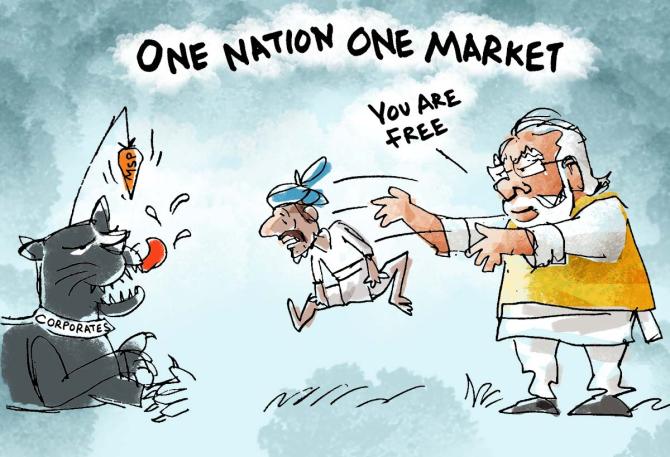There are farmers all across India who do not seem to like these "Introduction of new Farms bills".
Context:
The central government procures paddy & wheat directly from farmers through the food corporation of India for the public distribution system.
The mandi system is not going anywhere as per the current laws. Further, the Commission on Agriculture Costs and Prices (CACP), announces MSP for 23 crops each year, taking into account the cost of cultivation, amongst other parameters. Yet, MSP, apart from wheat and paddy, is rarely realized by farmers. Further, for horticulture crops, there is no MSP announced, never has been. It is also pertinent to note that an MSP guarantee has NEVER been part of any legal statute, since it was announced in the 1960s.
The mandis were hotbeds of corruption. Each states’ APMC Act mandated that any farm produce could only be bought from mandis. This meant that each mandi functioned as a monopoly.
Any new trader who wanted to enter required the consent of the marketing committee of the mandi.
Further, if you wanted to trace across the state, say from one district to another, you needed a separate license. Therefore, agriculture trade was non-existent. Hence, farmers suffered in both good years and bad. In good years, production gluts meant that prices would crash.
The Mandi System was in need of dire competition.
The traders and “arthiyas”, or commission agents exercised monopoly powers. They played the function of both moneylenders and buyers. Farmers were at their mercy.
Contract Farming
The Union government says this will protect and empower farmers to sell to anyone – a wholesaler or retail giant or exporter. They will have written contracts which will protect them if the buyer tries to cheat them, and they can sell future produce today, the government says.Critics however point out that this is wishful thinking. 82% of farmers in India are small and marginal farmers – that is, they farm on 2.5 to 5 acres of land. Is this farmer, who has 2.5 acres of land, going to be able to go to court against a massive supermarket chain?
What happens if the buyer says the contract cannot be fulfilled because the quality of crop is not what was agreed – what protection does the farmer have then?
Interestingly, there is no mention of a mechanism of fixing a price. There is also an apprehension that the free-hand given to private corporate houses could lead to farmer exploitation.
Interestingly, there is no mention of a mechanism of fixing a price. There is also an apprehension that the free-hand given to private corporate houses could lead to farmer exploitation.
- Corporate companies can now have contracts with farmers to buy their produce – but farmers will not have the protection of a Minimum Support Price.
- If a company decides at the end of the cycle that the produce is not ‘good enough’, then farmers may be forced to make a distress sale at prices much lower than the MSP, in marketplaces that are not regulated by APMCs. Basically, farmers can get exploited by corporates and the mechanisms proposed for their protection are impractical, say critics.
- Further, corporate retail chains can contract a whole bunch of farmers and hoard produce, and artificially increase prices for profit – and there will be little that consumers like you and me can do about it, say experts.
I personally believe that Government should form a parliamentary committee to assess & understand both the Pros & Cons, to be able bring legal support to farmers in cases of disputes before introducing such laws.
What do you think ?
